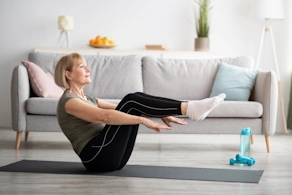How Weak Abdominal Muscles Affect Seniors And Ways To Strengthen Them
Strong abdominal muscles support balance, mobility, and posture, which become more important as you age. When core strength declines, everyday activities like standing, walking, and getting out of bed feel harder and riskier.
For Canadian seniors, addressing weak abdominal muscles improves independence, reduces fall risk, and supports better long-term health. Learn how abdominal muscles affect daily life, what causes them to weaken, and which strategies help you build strength safely and consistently.
Life Assure Product Quiz
Take our 30 second quiz and discover which Life Assure medical alert device is the right fit for you or a loved ones.
Life Assure Product Quiz
Take our 30 second quiz and discover which Life Assure medical alert device is the right fit for you or a loved ones.
The Role Of Abdominal Muscles In Senior Health
Your abdominal muscles do more than support your midsection—they stabilize your entire body. This group of muscles forms the core, working with your back and hips to keep you upright, steady, and moving with control.
Strong abdominal muscles improve:
- ● Posture, helping you stand and sit with less strain
- ● Balance, reducing your chance of falling
- ● Coordination, making movement more fluid and confident
For seniors, core strength directly affects how easily they perform daily activities like walking, lifting groceries, or reaching overhead. A stable core also reduces the load on their spine and joints, helping them stay active without pain or injury.
Causes Of Weak Abdominal Muscles In Seniors
Muscle loss becomes more common as you age, even if you're generally healthy. Understanding the causes helps you take practical steps to maintain strength.
Common contributors to weak abdominal muscles include:
- ● Inactivity: Sitting for long periods weakens the core muscles that support balance and posture
- ● Age-related muscle loss: Muscle mass naturally declines with age, especially without regular use
- ● Chronic conditions: Diabetes, arthritis, or neurological disorders can interfere with strength and movement
- ● Poor posture: Slouching or misalignment places less demand on core muscles, weakening them over time
- ● Post-surgery recovery: Limited movement during healing can cause abdominal muscles to lose tone
Recognizing these factors allows you to make changes that protect your mobility and reduce long-term complications.
Consequences Of Weak Abdominal Muscles
When abdominal muscles lose strength, the entire body feels the impact. These muscles stabilize the spine, support movement, and help you stay balanced. Without that support, everyday tasks become harder and riskier for seniors.
Potential effects of weak abdominal muscles include:
- ● Poor balance: Increases the chance of falls, which are a leading cause of injury among seniors
- ● Lower back pain: Weak core muscles place added strain on your spine and back muscles
- ● Limited mobility: Standing, walking, and bending become more difficult and tiring
- ● Loss of independence: Daily tasks like dressing, cooking, or bathing may require assistance
- ● Reduced confidence: Fear of falling or injury often leads to more inactivity, creating a cycle of weakness
Addressing core strength early helps you stay mobile, remain independent, and move confidently.
Practices To Strengthen Abdominal Muscles
Improving core strength doesn’t require intense workouts. Many seniors rebuild abdominal strength through low-impact exercises, daily activity, and proper nutrition. The goal is consistency, not intensity. Always talk to your healthcare provider before starting any new routine, especially if you have existing health conditions or mobility concerns.
Core Strengthening Exercises
Simple exercises help you activate your core without putting stress on your joints:
- ● Seated leg lifts: Sit tall in a chair, lift one leg at a time, and hold briefly to engage your abdominal muscles
- ● Pelvic tilts: Lie on your back with knees bent, gently tilt your pelvis upward to flatten your lower back
- ● Gentle yoga poses: Movements like cat-cow or bridge pose strengthen your midsection and improve flexibility
Perform these exercises slowly and with control. Focus on breathing steadily and keeping your core engaged. Start with a few repetitions and gradually increase as your strength improves. Even five minutes a day can make a noticeable difference over time.
Incorporating Physical Activity Into Daily Life
Adding movement to your daily routine reinforces abdominal strength naturally:
- ● Walk daily, even for short distances
- ● Tend to your garden or do light yard work
- ● Join a local fitness class for seniors
- ● Use stairs instead of elevators when possible
Regular movement activates your core muscles and supports circulation, joint health, and stamina. Staying active also supports brain health and mood, helping you feel motivated to keep going.
Nutrition And Muscle Health
A balanced diet fuels muscle repair and growth. Focus on:
- ● Protein: Eggs, legumes, dairy, and lean meats provide building blocks for muscle
- ● Vitamin D: Supports muscle function and works with calcium for bone strength
- ● Healthy fats: Promote energy and reduce inflammation
Eating well complements exercise efforts and keeps muscles strong over time. To support overall wellness, include fibre-rich foods and anti-inflammatory options like berries, leafy greens, and whole grains.
Tips For Maintaining Abdominal Muscle Health
Staying consistent with core-strengthening habits supports long-term strength and mobility. The key is building routines that feel doable and rewarding, so you stick with them.
Use these strategies to stay on track:
Simple exercises help you activate your core without putting stress on your joints:
- ● Set simple goals: Start with small, manageable targets like 5 minutes of movement each day
- ● Track your progress: Keep a journal or use a calendar to celebrate your consistency
- ● Mix it up: Rotate between exercises or activities to stay engaged and avoid boredom
- ● Schedule check-ins: Talk to your doctor or physiotherapist regularly to track changes and adjust your plan
- ● Listen to your body: Rest when needed, and make adjustments if you feel discomfort
With regular effort and thoughtful planning, you build strength, avoid setbacks, and enjoy greater daily independence.
Conclusion
Strong abdominal muscles support more than just posture—they empower your independence. When your core is stable, you move with confidence, reduce your fall risk, and handle daily tasks with less strain.
Addressing weak abdominal muscles early and consistently protects your health and improves your quality of life. Make time for movement, eat for strength, and talk with your care team about exercises that fit your needs. With regular effort, you build lasting strength that supports daily living. A stronger core helps you stay active, capable, and connected to the things you love.











 Get Help With The Push Of A Button
Get Help With The Push Of A Button














